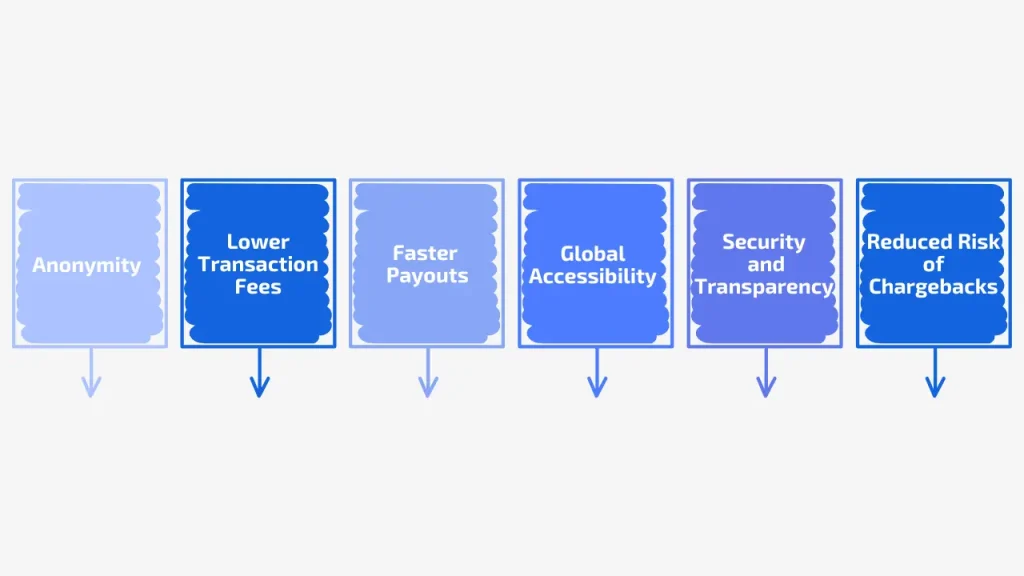The Impact of Cryptocurrency on Online Casino Gambling Industry

Cryptocurrency, a digital and virtual currency secured through cryptography, has been presently based as a new transformative factor in the digital economy. Acting independently of central banks and enabling secure, transparent, and effective decentralized transactions. Cryptocurrency is a secure, decentralized digital currency offering transparent transactions, with popular coins like Bitcoin and Ethereum creating new investment opportunities.
Table of Contents
- Introduction
- The Rise of Cryptocurrency
- Impact on Players
- Impact on Online Casinos
- Challenges of Regulating Cryptocurrency in the Gambling Industry
- How Different Countries Are Approaching Cryptocurrency in Online Casinos
- The Role of Blockchain Technology
- The Future of Cryptocurrency in Online Gambling
- Conclusion
Introduction
Current Market Stats
| REPORT COVERAGE | DETAILS |
|---|---|
| Market Size Value In | US$ 6.3 Billion in 2023 |
| Market Size Value By | US$ 55.3 Billion by 2032 |
| Growth Rate | CAGR of 27.29% from 2023 to 2032 |
| Forecast Period | 2024-2032 |
| Base Year | 2024 |
| Historical Data Available | Yes |
| Regional Scope | global |
| Segments Covered | By Type Cloud-based On-premises SMEs Large Enterprises |
| Source | Business Research Insights |
The Rise of Cryptocurrency
The adventure of cryptocurrencies has really been a fascinating process which kicked off from the birth of Bitcoin in 2009. Invented by a known person or group by the name of Satoshi Nakamoto, Bitcoin consists of blockchain technology and it gives you the option to put money in it. This was to be the bedrock where other cryptocurrencies would build their stories, blending into the narrative by the arrival of Ethereum, among others, as a groundbreaking contracting platform in 2015. Ethereum allowed developers to create decentralized applications (DApps) and facilitated the rise of decentralized finance (DeFi). Alongside Bitcoin and Ethereum, numerous altcoins—alternative cryptocurrencies—have emerged, each offering unique features and benefits. These coins such as Ripple (XRP), Litecoin (LTC), and Cardano (ADA) have essentially tried to address the limitations of older blockchain networks in terms of scalability, security, and efficiency.
Several key factors have been driving the adoption of Cyptocurrencies
-
Decentralization and Independence
The cryptocurrencies are decentralized and are governed independently without the need for central authorities — offering complete control to the user. These holders of value are often people who seek alternatives to banks and government-controlled financial systems, so it fits perfectly with them.
-
Security and Transparency
Most of the cryptocurrencies run on blockchain technology that assures safe, transparent, and resistant-to-tampering transactions. The public ledger enables anyone to verify a transaction; it will be difficult, therefore, to manipulate or counterfeit.
-
Global Accessibility
Cryptocurrencies are accessible to anyone with an internet connection; this in turn offers them the financial tool to be used for the unbanked and for the individuals in regions with unstable economies.
-
Lower Transaction Fees
In many cases, cryptocurrency transactions cost less than transaction fees set by traditional banking systems or payment processors. They are especially useful for cross-border transactions, which can come at very high charges when passing through a conventional bank.
-
Speculation and Investment
The increasing prices in cryptocurrencies, especially Bitcoin and Ethereum, have led to a surge in investment and speculative trading. Cryptocurrencies are seen by many investors as an attractive asset class, whether for long-term growth or short-term profit.
This is why cryptocurrency is an attractive payment method over the various other methods available. Cryptocurrencies are member’s only currencies, typically not issued or regulated by any one government; instead, they run on decentralized networks, enabling users to send and receive funds globally within moments at a fraction of the cost traditionally associated with wire transfers. With such traditional banking systems, intermediaries are typically needed, like banks and payment processors, which delays transactions and enhance costs.
In contrast, Unlike traditional banking systems, which require third-party intermediaries to transfer money from one bank to another, money is sent directly between users using cryptocurrency, resulting in faster, less expensive transactions. Cryptocurrencies have become an eye-catching decision for a wide range of sectors, particularly e-commerce, remittances, and online gambling, for the sake of the idea of transactions that are easy, convenient, and borderless. Furthermore, the possibility to secretly or pseudonymously perform transactions has contributed to the popularity of cryptocurrency among those people that are more or less privacy-driven when it comes to their financial transactions.
Cryptocurrency in Online Casino Gambling
Online casinos have quickly recognized the potential of cryptocurrency to enhance the gaming experience and cater to the evolving demands of players. As digital currencies have gained more acceptance, and a lot of casinos now include these types of money in their operating systems with the result of a great deal of benefits for both the players and the operators.

- How Online Casino Gambling Are Integrating Cryptocurrency Into Their Platforms
Online casinos are incorporating cryptocurrency in several ways, offering players the ability to deposit, wager, and withdraw funds using digital currencies. Some casinos exclusively accept cryptocurrency, while others allow players to choose between traditional payment methods (such as credit cards or bank transfers) and cryptocurrency. In this integration, existing payment gateways are transformed to allow cryptocurrencies, and secure and reliable wallets are chosen for keeping digital funds, as well as making sure that games and transactions are in line with the local regulations for online gambling.
These days, cryptocurrencies are not only used for payment transactions, but they are also being used in a number of cool ways within the gambling ecosystem. For instance, some casinos have started using smart contracts (primarily powered by Ethereum) to automate processes such as payouts, betting conditions, and fairness mechanisms. Blockchain technology ensures that these operations are transparent, verifiable, and tamper-proof, which enhances player trust in the platform.
- Popular Cryptocurrencies Used in Online Casino Gambling
- Bitcoin (BTC): Being the very first and most famous of the cryptocurrencies, Bitcoin remains the dominant currency in the online gambling sector. Its large market capitalization, widespread recognition, and established infrastructure make it an appealing choice for both operators and players.
- Ethereum (ETH): Known for its smart contract functionality, Ethereum is a popular choice for online gambling platforms that want to offer decentralized applications or incorporate additional features like provably fair gaming.
- Litecoin (LTC): Often seen as the “silver to Bitcoin’s gold,” Litecoin offers faster transaction times and lower fees, which makes it a favourite among online gamblers.
- Ripple (XRP): Ripple is favoured by online casinos because of its fast transaction processing capabilities and minimal transaction costs, especially in international transactions.
- Bitcoin Cash (BCH): A spin-off of Bitcoin, Bitcoin Cash aims to offer faster and cheaper transactions, making it convenient for online casinos to make quick deposits and withdrawals.
- Other Altcoins: In addition to BTC, other rising altcoins, such as Dogecoin (DOGE) and Cardano (ADA), are also starting to see use in the online gambling space thanks to their lower transaction costs and active user base.
- Advantages of Using Cryptocurrency for Online Casino Gambling

- Anonymity: The ability of cryptocurrencies to be bought anonymously or pseudonymally is among their most appealing aspects. Sensitive personal information like banking information is not needed of players, so guaranteeing more privacy and security. More than that, the fact that their anonymity is not diminished is a major reason for their attraction, which is what we will claim.
- Lower Transaction Fees: High fees are typically charged in the traditional banking and payment processing systems, especially for cross border transactions. Unlike credit cards, cryptocurrencies usually charge less then or even free of fees, which brings great benefit for players and online casinos. Lower costs also mean faster winnings processing and more bang for their buck for gamers.
- Faster Payouts: One of the main drawbacks of traditional banking systems in online gambling is the delay in processing withdrawals. Depending on the method, it can take several days for a player to receive their winnings. With cryptocurrencies, transactions are processed much faster, often within minutes, ensuring that players can access their funds more quickly and without the frustration of long waiting periods.
- Global Accessibility: Cryptocurrencies can actually reach even those who are unbanked or reside in areas with unstable economies, thanks to the fact that anyone with an internet connection can use one.
- Security and Transparency: Blockchain technology utilization in cryptocurrency transactions allows for the improvement of both security and transparency. Every single transaction is written down on a ledger available to the public, verifiable by any party, this makes it almost impossible to change or rig results.
- Reduced Risk of Chargebacks: Unlike credit card payments, which can be reversed through chargebacks, cryptocurrency transactions are irreversible once confirmed. This eliminates the risk of chargebacks, which can be a major issue for online gambling platforms dealing with fraud.
Impact on Players
The rise of cryptocurrency in online casino gambling has significantly impacted players, offering both new benefits and challenges. As cryptocurrencies continue to gain prominence, the way players interact with online gambling platforms has evolved in several key ways.
- Enhanced Privacy and Security for Players
One of the most notable advantages of using cryptocurrency in online gambling is the enhanced privacy and security it provides. Unlike traditional payment methods, such as credit cards or bank transfers, cryptocurrency transactions can be made without revealing sensitive personal information. Players can maintain a greater level of anonymity, reducing the risk of identity theft, fraud, or unauthorized access to their financial data.
Moreover, the decentralized nature of cryptocurrency means that transactions are secured by blockchain technology, which is incredibly resistant to tampering and fraud. Blockchain’s public ledger ensures transparency while maintaining the integrity of every transaction. For players, this leads to a more secure and private gambling experience, as they can trust that their funds and information are safe from third-party interference.
- Accessibility for International Players
Cryptocurrency has also brought a global audience to the online gambling world. The traditional mode of payment can have many limitations and PDEs tend to have geographical restrictions. For example, players in certain countries may have limited access to international banking systems, or gambling sites may be restricted based on the region. Cryptocurrency eliminates these barriers by allowing international transactions without the need for intermediaries or government-imposed restrictions.
Players in regions where online gambling is otherwise restricted can use cryptocurrency to bypass regional limitations. With digital currencies, players can easily deposit and withdraw funds without concern for local banking regulations or payment processor blockages. This has made online casinos more accessible to players worldwide, especially in regions with unstable banking systems or prohibitive exchange rates.
- The Appeal of Cryptocurrency Bonuses and Promotions
- The Learning Curve and Adoption Challenges for Players
Despite the numerous advantages, there are some challenges for players who are new to cryptocurrencies. Many people find the ideas of digital currencies and blockchain technology challenging. Setting up cryptocurrency wallets, purchasing coins, and understanding the process of transferring funds to and from online casinos can be a steep learning curve for beginners.
Additionally, the volatility of cryptocurrency prices can make players hesitant to dive in. For those players who are used to the stability of conventional currencies, the value of a cryptocurrency like Bitcoin or Ethereum can vary greatly, so their wins may be substantially less (or more) than expected. For those open to change, cryptocurrency offers a fast and secure gambling experience.Cryptocurrency promises a dynamic, secure gambling experience for the believers in the changes.
Impact on Online Casinos
The general introduction of cryptocurrencies into the realm of online casinos has greatly changed the operations of the operator. From boosting cost-effectiveness to attracting new rivals, cryptocurrencies are changing the online gaming market. However, on the flip side, the merits are imposing, but the risks are also numerous and this is the challenge that purposeful currency deals with.

- Cost-Efficiency for Operators (Lower Transaction Fees, Reduced Fraud Risks)
One of the main reasons online casinos have adopted cryptocurrency is that it is cost-efficient. By using cryptocurrencies, casinos can significantly reduce transaction fees because cryptocurrencies bypass intermediaries, such as banks or payment processors, that typically charge fees for handling payments. Cryptocurrency transactions are a one and done deal – once confirmed they cannot be reversed, which minimizes the risk of chargeback fraud and reduces the administrative costs associated with handling disputes. This increased security reduces fraud risks for online casinos, allowing them to save both time and money.
- Attracting a New Demographic of Tech-Savvy Players
The use of cryptocurrency can appeal to a new generation of tech masters who are used to the world of digital currencies and blockchain. Particularly among younger players, there is a growing willingness to use cryptocurrencies for online purchases, investments, and entertainment — including gambling. These age groups are more familiar with decentralized finance and crypto wallets and how they work, which equips them to make choices in favor of an online casino that accepts cryptocurrency. Bonus offerings: The tech-savvy nature of these crypto enthusiasts enables them to build bonuses to their advantage and use exclusive crypto-based offers to great effect. Online casinos increase their potential customer base with the introduction of cryptocurrency, particularly targeting customers who are using alternative payment methods or who desire a more anonymous and secure betting environment.
- Regulatory Challenges and Compliance with Laws
One major challenge that online casinos are up against when adopting cryptocurrency is the tangled regulatory landscape. Cryptocurrencies are relatively new and, as such, are not universally regulated across different jurisdictions. The legal status of cryptocurrencies and online gambling varies widely from country to country, and in some regions, the use of cryptocurrency in gambling may be illegal or subject to specific restrictions.
Operators have to guarantee that they are in line with local and international laws and regulations. Some countries may have stricter regulations around the use of cryptocurrency in gambling, requiring casinos to implement Know Your Customer (KYC) procedures or restrict the types of cryptocurrencies they accept. This may result in the operators having to perform more administrative work, particularly in the jurisdictions where new or undefined rules are in place.
Also, the anonymity afforded by cryptocurrencies might give rise to concerns on the part of regulators, especially regarding money laundering or terrorist financing. In turn, casinos are obliged to take the initiative to put up compliance safeguards against such risks and keep their licenses. This could well require costly legal consultations and adjustments to their business models.
- Risks and Volatility Associated with Cryptocurrencies in Gambling
Cryptocurrencies can be advantageous and hugely risky for online casinos. Fluctuations in price value happen quite fast with cryptocurrencies like Bitcoin and Ethereum, which a lot of players have taken into consideration while weighing jackpot odds. Such a disposition can create insecurities for players and operators.
For players, their deposits or winnings may have wildly different values after a sharp, market-induced fluctuation, which can be off-putting for those accustomed to the stability of traditional currencies. For casinos, the volatility could impact the overall value of their revenue, especially if they hold large amounts of cryptocurrency in their wallets. If the value of a digital currency drops suddenly, operators could face significant losses, and this unpredictability may complicate financial forecasting and planning.
Furthermore, general transactions are fast and very efficient but sometimes can be delayed due to network congestion or heavy demand and possibly incur higher transaction fees for transactions with quick activity on networks such as Ethereum. This can hurt players’ uninterrupted experience and gradually introduce more operational challenges for the casino, especially in busy times.
Last but not least is the risk concerning technological and security failures. While blockchain technology is known to be secure, cryptocurrency exchanges and wallets are still prone to hacking and other cyber breaches. If in case a casino’s cryptocurrency wallet becomes breached, losses will occur, and as such the online casino may become held liable for any loss of funds through abduction. In such a case, then an online casino would be safer putting more resources into cybersecurity so as to protect both themselves and their players. The legal and regulatory landscape in regard to cryptocurrency can be complicated in this sphere of gambling, given the interplay of traditional gambling regulations, financial laws, and learning technology policy. Below is a breakdown of some key points:
Challenges of Regulating Cryptocurrency in the Gambling Industry

- Lack of Clear Legal Frameworks:Numerous countries do not have detailed cryptocurrency regulations and the decentralized aspect of crypto challenges conventional regulatory methods.
- Anonymity and Money Laundering: Cryptocurrency enables the anonymity of transactions, which could create the opportunity for illegal activities, which include, but are not limited to, money laundering or fraud in online gambling.
- Volatility: The value of cryptocurrencies exhibits wild swings, which could impact the stability of operators and the experience of the players.
- Cross-Border Issues: Since cryptocurrencies are digital and borderless, operators may face challenges when dealing with international laws, making it difficult to regulate crypto gambling in jurisdictions with differing legal standards.
- Consumer Protection: Ensuring that players are protected, particularly in terms of fair play and the security of their funds, is difficult in an unregulated space. Cryptocurrency transactions can be irreversible, leaving little recourse for players in the event of disputes.
How Different Countries Are Approaching Cryptocurrency in Online Casinos
- United States: The United States has a haphazard way with this set of regulations. Some states, like New Jersey and Pennsylvania, allow cryptocurrencies in online gambling, whereas others outright ban it. For federal law, however, it hasn’t come up with a clear set of rules on using cryptocurrency in gambling. It is actually still an area of active legal contest.
- United Kingdom: The UK has some of the most developed regulatory frameworks for online gambling, but cryptocurrencies are not yet fully integrated into mainstream gambling platforms. The UK Gambling Commission closely monitors the use of cryptocurrencies for issues like consumer protection and fair play.
- Malta: Malta has adopted a progressive approach and is one of the few countries to have introduced specific regulatory frameworks for cryptocurrencies in the gambling sector. Malta’s regulatory body, the Malta Gaming Authority, has provided guidelines for operators who wish to accept cryptocurrencies.
- Estonia: Estonia has embraced blockchain and cryptocurrency technology. The country’s regulatory environment for crypto is relatively friendly, and online gambling operators are able to use crypto within the legal framework, though compliance with anti-money laundering regulations is still enforced.
- Asia (e.g., Japan, China): In contrast with countries like China strongly standing against cryptocurrency, including outright bans on crypto-related activities, Japan legalized Bitcoin as an official means of payment and allowed some online casinos to receive cryptocurrencies under certain regulations.
The Role of Blockchain Technology in Ensuring Fairness and Transparency
- Provably Fair Games: The blockchain brings fairness into gambling by assuring the game results are transparent and verifiable. The consequences of this can empower players to be able to validate the game’s fairness individually through the public ledger, which will reduce the fear of losing. Seeing that there are rigged outcomes can strengthen trust between the operators and players.
- Transparency of Transactions: The use of a central ledger makes the blockchain visible to all and, therefore increases transparency between users and regulators.
- Security: Security: The decentralized nature of blockchain combined with cryptographic algorithms gives it the power of extreme security against hacking, fraud, or tampering. This is of utmost importance in the gambling industry, where there should be a high degree of protection around the player’s funds and sensitive data.
- Smart Contracts: Smart Contracts-Smart contracts are contracts that automatically enforce and perform some of the functions of gambling transactions or bets without the intervention of intermediaries. This arrangement would lower costs and reduce the risk of human errors.
Potential Future Developments in Crypto-Related Gambling Legislation
- Standardization of Crypto Regulations: Standardization of Crypto Regulations: Efforts could be made to set, across the board, internationally accepted standards for cryptocurrency gambling to provide clearer guidelines for operators and regulators across borders.
- Increased Consumer Protection: In the future, legislation may target the effective players’ protection against gambling by seeing to it that all the gambling platforms conform to the principles of fair play.
- Integration with Traditional Financial Systems: Governments might look for ways to integrate cryptocurrencies with traditional financial systems to provide more effective regulation and synergy.
- Smart Contract Auditing: With the increasing popularity of smart contracts among online casinos, regulators may concern themselves with establishing a protocol surrounding a more formal auditing procedure to ensure integrity in all respects.
- Cross-Border Collaboration: Cryptocurrency gambling will likely expand with cross-border effects and increased cooperation between countries to address the related issues, particularly the taxation, anti-money laundering, and consumer protection challenges.
The Future of Cryptocurrency in Online Gambling
- Predictions for Growth: Cryptocurrency is likely to become much more popular in online gambling as more sites accept digital currencies for payments. More interest in blockchain technology and decentralized finance (DeFi) may lead to growth in this area.
- Potential Innovations: Very few innovations, such as decentralized gambling platforms (games controlled by players) and NFT-based casinos (casinos using NFTs as gaming assets or rewards), are attracting interest.
- Role of Stablecoins: The Role of Stablecoins: Stablecoins, fiat-pegged coins or altcoins designed not to fluctuate wildly in value may reduce the volatility usually associated with a cryptocurrency. This gives players and casinos a more secure and calculated means of transacting without fearing an extreme price fall.
- Ongoing Challenges for Mainstream Adoption: While there is a chance for momentum, challenges in regulatory uncertainty, public trust, and the complexity of crypto still slow down wide-scale acceptance. Providing a friendly customer experience appended to a well-defined legal framework should help mitigate the hurdles it encounters.
Conclusion
On top of that, Cryptocurrency can radically change the online gambling industry — anonymity, quicker transactions, and enhanced security through blockchain. However, regulatory uncertainty and differing national attitudes to crypto gambling persist. Tecpinion aims to leverage the unique opportunities blockchain technology creates for fair play and transparency, and we are particularly excited about conceptual models like decentralized gambling and NFT-based casinos. While this highlights a potential avenue for adoption through stablecoins, much of the volatility synonymous with cryptocurrencies could be mitigated.
Tecpinion accordingly highlights the inherent necessity of security and responsible gambling, recommending players think about stablecoins to mitigate volatility red flags. It requires that an operator’s compliance, transparency, and player education are to be placed at the forefront of this new age of crypto gambling.
Want to know more
about Online Casino Gambling
read out the related blogs
Recent Post
-
Are All Sweepstakes Casinos Social Casinos? Debunking Common Misconceptions
-
Why Multi-Language Support is Essential for Online Casino Affiliate Success in 2025
-
Best Crypto Casino Software Providers: A Guide to Picking the Right One
-
The Ultimate List of Top 10 Sweepstakes Casino Apps in the USA 2025
-
Top B2B iGaming Platform Companies You Should Know in 2025

